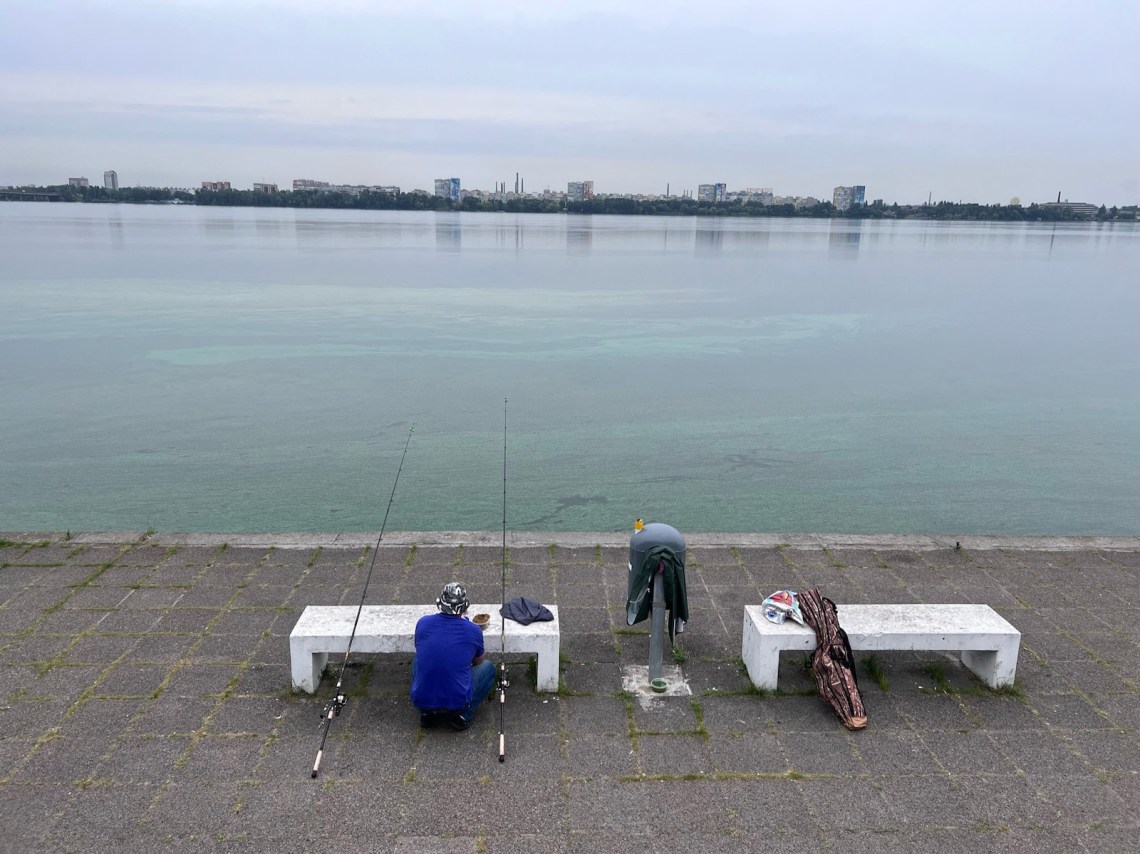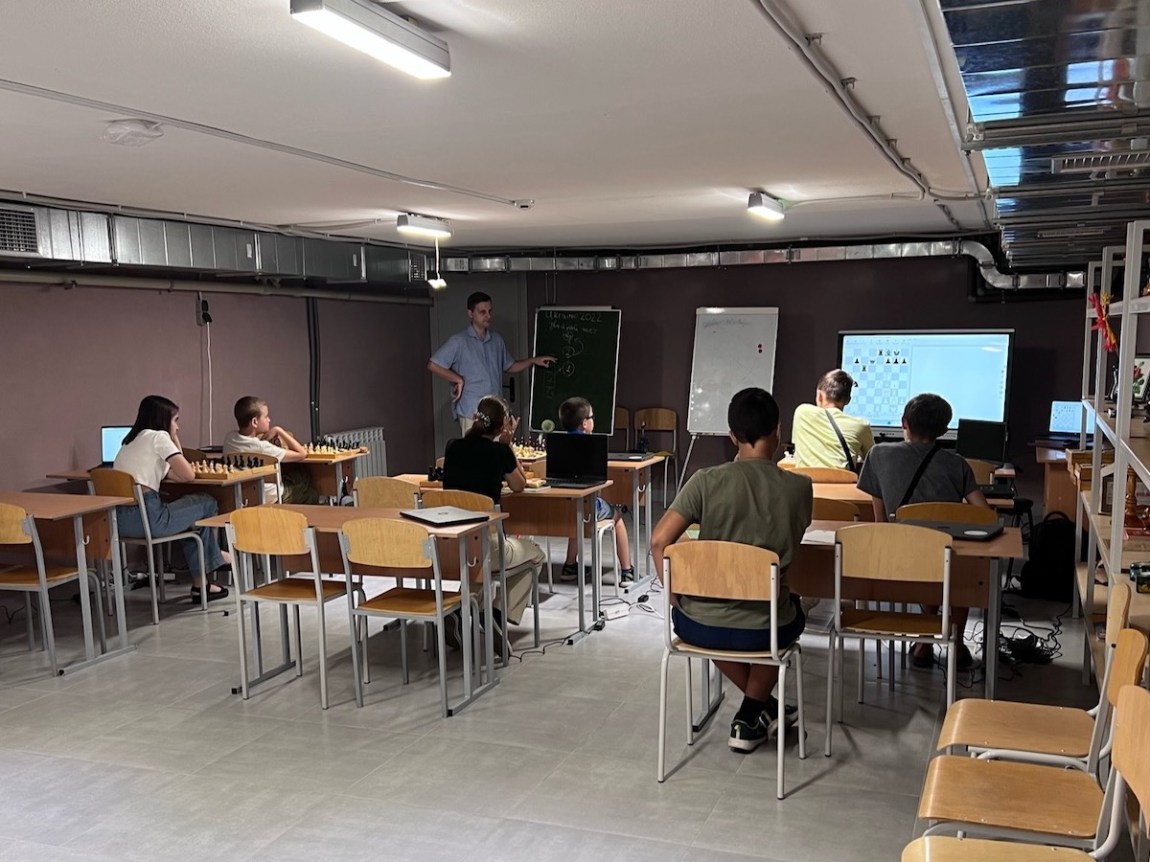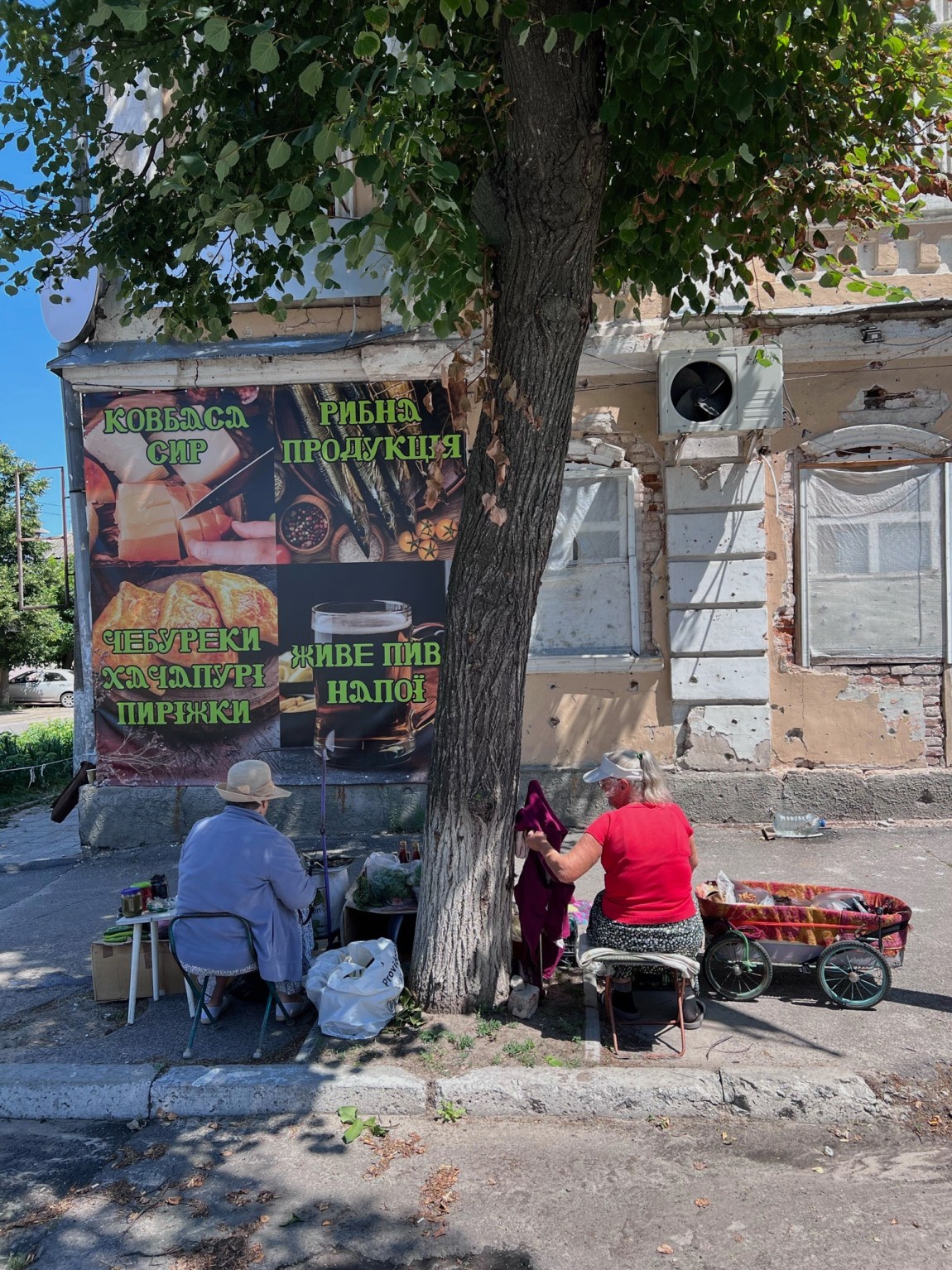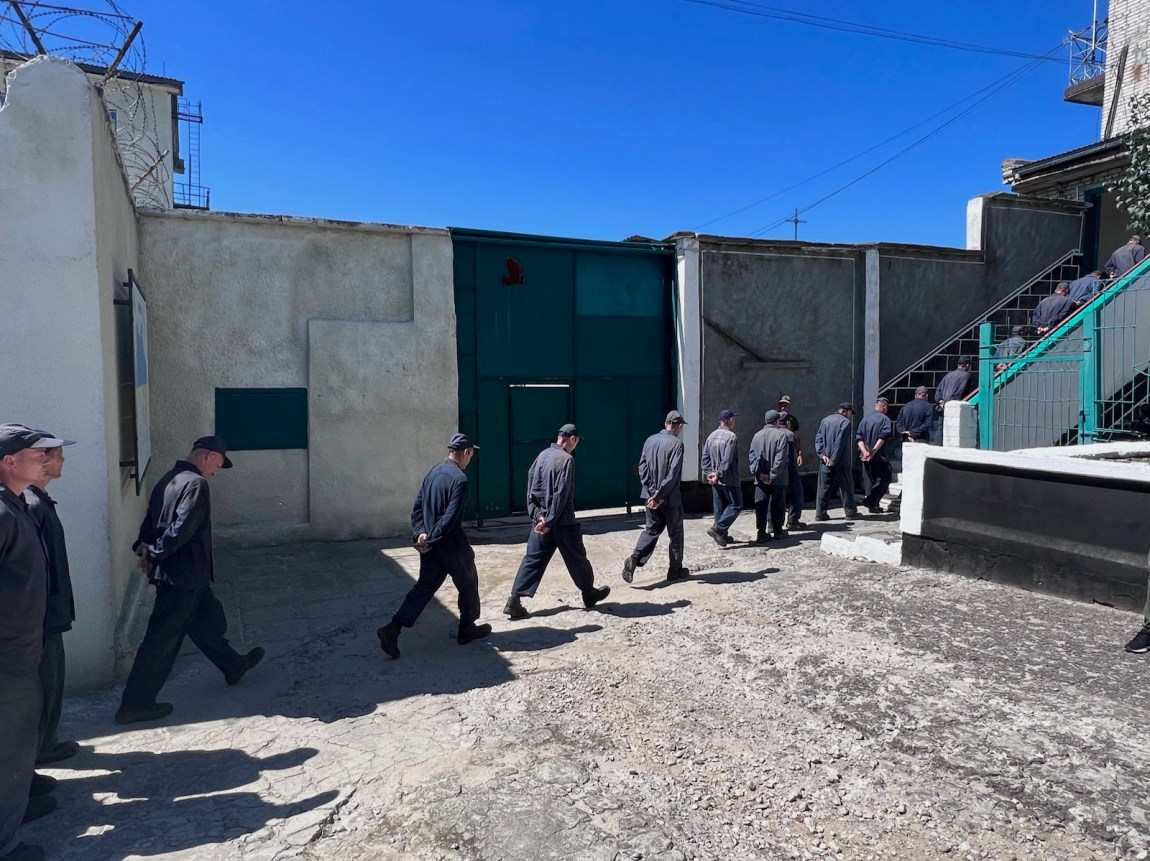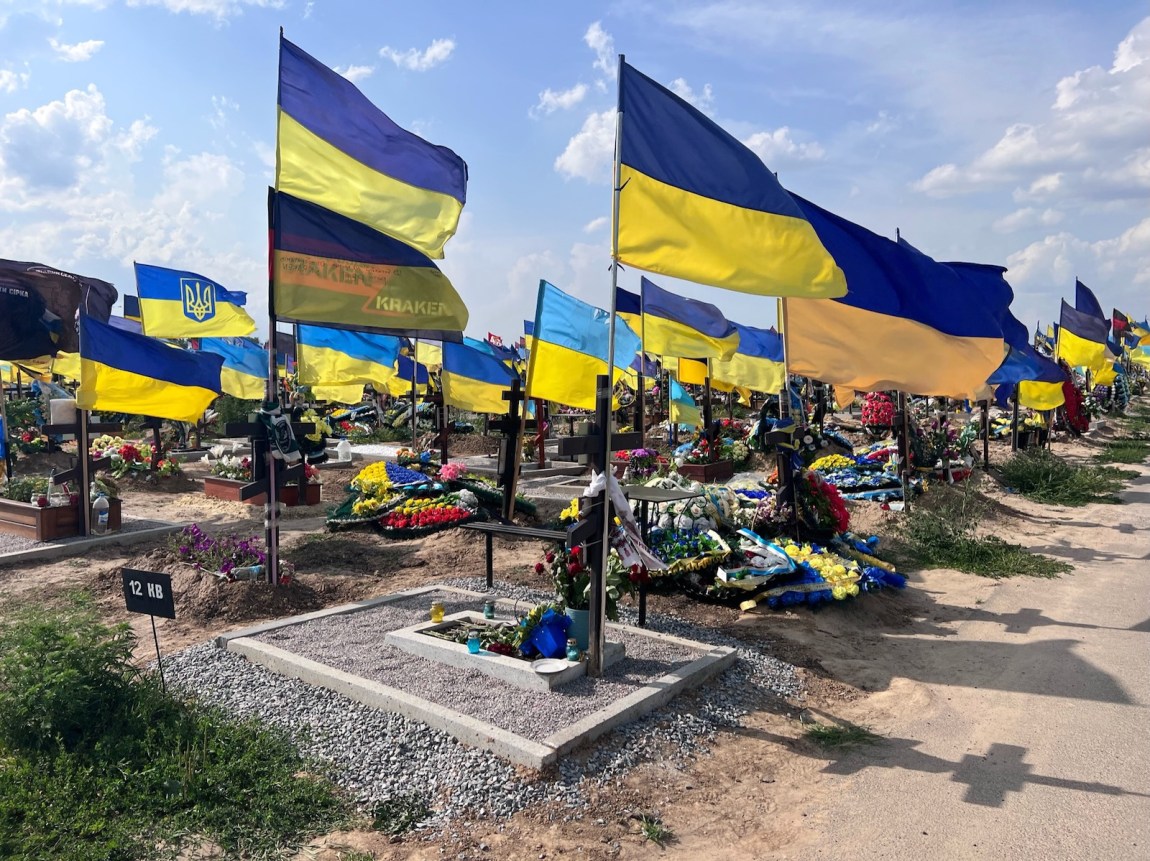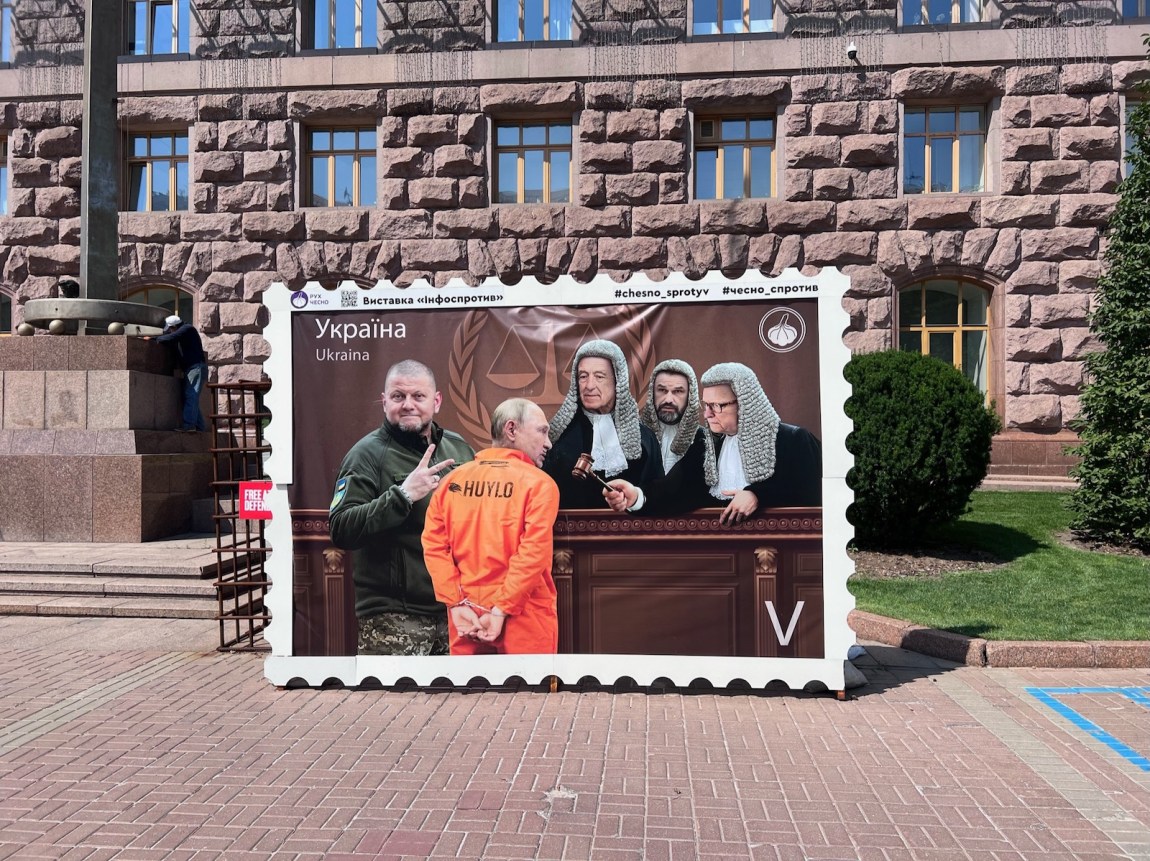From a ruined gas station on a hill in the village of Preobrazhenka, in Ukraine’s southeast, you can hear the sound of outgoing artillery and see plumes of smoke rising in the distance. Armored demining equipment, tanks, and SUVs packed with soldiers rumble or speed past. Six miles south, on the southern Zaporizhzhia front, the Ukrainian Army has punched a hole in the formidable defenses Russia has built along the six-hundred-mile frontline. I was hoping to understand whether Ukraine’s counteroffensive, which began in early June, was failing, succeeding, or just moving a lot slower than expected. But the view was obscured by black swans flying gracefully in V formations.
“We are in black swan times,” Pavlo Kazarin, a journalist and author from Crimea told me. He enlisted as a Ukrainian soldier as soon as the full-scale invasion began. I first heard him talk in July in nearby Dnipro, on a panel organized by the Aspen Institute Kyiv and Impact Hub Odessa on the future of Ukraine’s stability and security. He was the first, but not the last, person I’ve recently encountered who mentioned the swans. The expression comes from the 2007 book The Black Swan: The Impact of the Highly Improbable by Nassim Nicholas Taleb, a statistician and financial risk analyst. Taleb’s theory is that history is disproportionately influenced by rare events that are impossible to predict, and it is not surprising that it has become popular in Ukraine. Tymofiy Mylovanov, the president of Kyiv School of Economics, told me that the most important turning points in the nation’s modern history have “all been driven by…zero-probability, high-influence events.” Those include the 1986 explosion at the Chernobyl nuclear plant, which contributed to one of the biggest black swans in recent times: the break-up of the Soviet Union, and hence Ukrainian independence, in 1991. Ukraine’s revolutions of 2004 and 2014, the annexation of Crimea by Vladimir Putin in 2014, and his all-out invasion on February 24, 2022, were all similarly unforeseen. The implication of this is that Ukrainians need to be prepared for any eventuality including the ramifications of events over which they have no control.
On July 25, in a cafe in Lyman eight miles from the front in eastern Ukraine, a soldier who goes by the call sign “Fox” told me that if someone had said two years ago that today Kyiv would be under Russian missile attack, “everyone would just laugh.” A Grad multiple rocket launcher drove past the cafe. Fox, who has been fighting the Russians since 2014, said that he has learned “not to rely on expectations, on building hope.” After Russia destroyed the Nova Kakhovka dam in June, what could Ukrainians expect next, he asked rhetorically—would Russia “nuke us, or blow up the Zaporizhzhia nuclear plant?” Weeks later, Russia was rocked by a black swan event of its own: the mutiny of Yevgeny Prigozhin, the leader of the Wagner mercenary group. “It just taught me to be prepared for everything,” said Fox, “and then to adapt to changes as fast as possible.” Two missiles streaked overhead toward Russian positions. It was a good time to leave Lyman.
Three months into the counteroffensive, think-tankers, experts, retired military men, and officials of all sorts are churning out opinions on how it has failed, or—take your pick—why it is actually doing quite well. Optimists note that many Russian logistics and arms depots are being destroyed away from the front, beyond the view of Western journalists. But at no point do these forecasters acknowledge that their predictions might be easily thrown off. Many of these same people thought Putin would never attack Ukraine, and when he did, they said Kyiv would fall within days. “We tend to rely on our historic inertia,” Mylovanov told me. “You would think that everyone would have left Ukraine by now” (more than 6 million people have left the country since the invasion began) “but a good 86 percent are here in Ukraine, right? People still live in Odesa, people live in Kharkiv…it makes me wonder what else people not directly in the firing line don’t understand about the world.”
*
Kazarin told me that many of his fellow soldiers believe Ukraine’s allies are reluctant to give it all the weapons it needs because they fear an escalation with Russia could end in nuclear war. But he points out that Crimea and four partially occupied Ukrainian provinces have already been annexed, so according to the Russian constitution every Western missile or tank deployed in those regions is being used inside Russia. If Western countries consider Ukraine only to be protecting itself, then their help is “charity,” he said. But if Ukraine is in fact fighting to protect NATO countries, like the Baltics and Poland, it can demand whatever help it needs: “Either we will be fighting with your weapons on our territory, or, if we fail, you will be fighting with your weapons on your territory.” Kazarin firmly believes that Russia would not dare risk war with NATO, but that could change as “the empire’s appetite continues to grow.”
Advertisement
There is an alternative to all-out war with Russia. What happens if the lines freeze? Ukraine was as lively a democracy as any before the invasion, but normal politics came to a screeching halt in February 2022. In Kazarin’s words, the war has been “like some kind of anaesthetic.” Since it began, Ukrainians have been “united around the theme of victory, of supporting the army.” Now something is stirring. That is not to say things are returning to normal—there can be no elections as long as martial law remains in place. But in recent months, debates about how Ukraine might look after the war have started to be held in public. As I learned at the panel in Dnipro, quite apart from the fact that we don’t know how the war will end or what the black swans will do, managing expectations is crucial.
When I asked people what might happen “after the war,” more often than not they would reply, “after our victory….” No one seems to doubt that victory is inevitable, but the definition of victory has changed. In the first days and weeks of the invasion, it meant pushing the Russians out of all the territories they had just invaded, i.e., back to Russia and the territories already seized in 2014. But after the Ukrainians’ stunning successes around Kyiv, Kharkiv, and Kherson, expectations soared. If they could beat back the Russians there, then they could do the same anywhere. Now, every Ukrainian I speak to is absolutely clear: victory means returning Ukrainian sovereignty to every inch of the country that lies within the internationally recognized borders of 1991. That includes Crimea and the parts of the Donetsk and Luhansk provinces over which the Russians gained de facto control in 2014.
The black swans may deliver that sort of victory, but it is equally possible that they will not. When the counteroffensive began, commentators and officials such as the military intelligence chief Kyrylo Budanov led Ukrainians to believe that the Russian military would soon collapse and Crimea would return to the Ukrainian fold. Around the first anniversary of the invasion, Maria Avdeeva, an analyst from Kharkiv, told me that Ukrainians “were looking forward to the summer” because they thought the war would be over by then. Some were even saying they would see one another on holiday in Crimea. “They were not joking.” Eventually senior military and government officials began to tamp down expectations. Now, Avdeeva says, “people realize very, very vividly that the war is not going to end soon.”
If Russia manages to hold on to most of what it currently occupies, Ukraine may come under pressure from its allies to negotiate some form of truce. Pundits sometimes cite the 1953 Korean armistice, which called for “a complete cessation of hostilities and of all acts of armed force in Korea until a final peaceful settlement is achieved,” as a model for a Ukraine–Russia deal. Such a treaty would be highly unpopular among most Ukrainians unless they come to reckon that soldiers are dying for nothing. An end to the fighting along the current lines would likely allow Russia to consolidate its hold on the occupied territories, change their demography by importing hundreds of thousands of settlers from Russia (as has been done in Crimea), and use its education system to shape the minds of a new generation.
When I talked in August to Ella Libanova, one of Ukraine’s foremost demographers, she was categorical: without NATO membership, any truce would mean that in three or five years Russia would simply return to finish the job. A vulnerable Ukraine would continue to lose people to emigration, and its economy would not be able to recover enough in order to sustain an army strong enough to repel the Russians again. In her view, only a return to 1991 borders can give Ukraine the security it needs, because it would mean a catastrophic defeat for Russia’s army, tantamount to its destruction.
Others are not so apocalyptic. Still, some foresee an ominous turn in Ukrainian politics if the most ambitious hopes for victory are dashed. In previous decades the primary political fault line in the country was between pro-Western and pro-Russian parties, but that division will be superseded now that Russia has destroyed the legitimacy of the latter. The new political scene might well be split between pro-Europeans and nationalist populists peddling, as Kazarin put it, “the politics of grievance.” Yevhen Hlibovytsky, an analyst and founder of the pro.mova think tank, goes one step further, naming the risk “Orbánism.” In other words Ukraine might follow in the footsteps of Hungary’s autocratic, nationalist leader Viktor Orbán, albeit obviously shorn of his Kremlin-friendliness.
Advertisement
Orbán has long stoked grievance, blaming foreigners for Hungarian ills, by harping on about the Treaty of Trianon of 1920, by which Hungary lost two thirds of its territory. Hlibovytsky thinks that Ukrainian populists may do the same: casting doubt on the West’s pledge to help Ukraine “for as long as it takes” by pointing out that Western support was slow to arrive or insufficient. (The US-made F-16 fighter jets promised by Denmark and the Netherlands, for instance, will not come until next year.) Nationalist populists would mourn people needlessly lost in the occupied territories and to emigration, and then protest that Ukraine is being forced to accept immigrants to fill their shoes. If Ukrainians become persuaded that they were “starved of arms” by a fickle and timorous West, Hlibovytsky believes it could fatally weaken the political center and energize the “anti-Russian and anti-Western” political forces, “which would align with other now marginal groups such as the former pro-Russian core, the ultra-conservative religious core, and the populist nationalist core.”
Oksana Forostyna, a writer and the opinion editor of the website Ukraina Moderna, adds that much of the pro-Russian politics that previously defined the east and south was less earnestly pro-Russian than is widely believed. It was a form of populism in and of itself, and its party machines were sources of patronage and jobs, which was ultimately why many people voted for them. She predicts that populist politicians will pivot to a “pro-Ukrainian but still anti-Western position,” weaponizing, among other things, anti-LGBT bigotry to stoke fears of cultural imposition from the West, as has been done in Russia, Hungary, and Poland.
Mylovanov, for one, rejects the idea that a disappointed Ukraine will turn to embittered nationalism if every inch of the country is not soon liberated: people died during the revolution of 2014, Russia annexed Crimea and in effect grabbed parts of Donetsk and Luhansk, “the West didn’t do shit,” and Ukraine continued as a pluralistic open democracy. But he stresses that in the years to come it will be important for Ukrainians to create excitement about becoming part of Europe rather than build a future on anti-Russian solidarity. “Yes, we are against them because they are killing us,” but Ukraine must define itself as being “for democracy, for freedom and development,” he told me. “We are not going to use their methods.”


